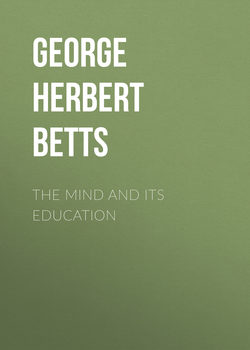Читать книгу The Mind and Its Education - George Herbert Betts - Страница 5
CHAPTER I
3. CONTENT OF THE MENTAL STREAM
ОглавлениеWe have seen that our mental life may be likened to a stream flowing now faster, now slower, ever shifting, never ceasing. We have yet to inquire what constitutes the material of the stream, or what is the stuff that makes up the current of our thought—what is the content of consciousness? The question cannot be fully answered at this point, but a general notion can be gained which will be of service.
Why We Need Minds.—Let us first of all ask what mind is for, why do animals, including men, have minds? The biologist would say, in order that they may adapt themselves to their environment. Each individual from mollusc to man needs the amount and type of mind that serves to fit its possessor into its particular world of activity. Too little mind leaves the animal helpless in the struggle for existence. On the other hand a mind far above its possessor's station would prove useless if not a handicap; a mollusc could not use the mind of a man.
Content of Consciousness Determined by Function.—How much mind does man need? What range and type of consciousness will best serve to adjust us to our world of opportunity and responsibility? First of all we must know our world, hence, our mind must be capable of gathering knowledge. Second, we must be able to feel its values and respond to the great motives for action arising from the emotions. Third, we must have the power to exert self-compulsion, which is to say that we possess a will to control our acts. These three sets of processes, knowing, feeling, and willing, we shall, therefore, expect to find making up the content of our mental stream.
Let us proceed at once to test our conclusion by introspection. If we are sitting at our study table puzzling over a difficult problem in geometry, reasoning forms the wave in the stream of consciousness—the center of the field. It is the chief thing in our thinking. The fringe of our consciousness is made up of various sensations of the light from the lamp, the contact of our clothing, the sounds going on in the next room, some bit of memory seeking recognition, a "tramp" thought which comes along, and a dozen other experiences not strong enough to occupy the center of the field.
But instead of the study table and the problem, give us a bright fireside, an easy-chair, and nothing to do. If we are aged, memories—images from out the past—will probably come thronging in and occupy the field to such extent that the fire burns low and the room grows cold, but still the forms from the past hold sway. If we are young, visions of the future may crowd everything else to the margin of the field, while the "castles in Spain" occupy the center.
Our memories may also be accompanied by emotions—sorrow, love, anger, hate, envy, joy. And, indeed, these emotions may so completely occupy the field that the images themselves are for the time driven to the margin, and the mind is occupied with its sorrow, its love, or its joy.
Once more, instead of the problem or the memories or the "castles in Spain," give us the necessity of making some decision, great or small, where contending motives are pulling us now in this direction, now in that, so that the question finally has to be settled by a supreme effort summed up in the words, I will. This is the struggle of the will which each one knows for himself; for who has not had a raging battle of motives occupy the center of the field while all else, even the sense of time, place and existence, gave way in the face of this conflict! This struggle continues until the decision is made, when suddenly all the stress and strain drop out and other objects may again have place in consciousness.
The Three Fundamental Phases of Consciousness.—Thus we see that if we could cut the stream of consciousness across as we might cut a stream of water from bank to bank with a huge knife, and then look at the cut-off section, we should find very different constituents in the stream at different times. We should at one time find the mind manifesting itself in perceiving, remembering, imagining, discriminating, comparing, judging, reasoning, or the acts by which we gain our knowledge; at another in fearing, loving, hating, sorrowing, enjoying, or the acts of feeling; at still another in choosing, or the act of the will. These processes would make up the stream, or, in other words, these are the acts which the mind performs in doing its work. We should never find a time when the stream consists of but one of the processes, or when all these modes of mental activity are not represented. They will be found in varying proportions, now more of knowing, now of feeling, and now of willing, but some of each is always present in our consciousness. The nature of these different elements in our mental stream, their relation to each other, and the manner in which they all work together in amazing perplexity yet in perfect harmony to produce the wonderful mind, will constitute the subject-matter we shall consider together in the pages which follow.
